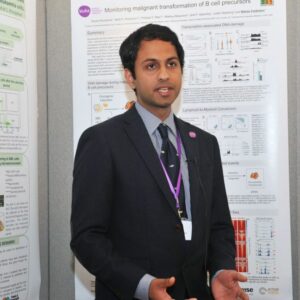
12 Jun 2021 Research
First Medical Research Council and Leukaemia UK Clinical Research Training Fellow shares project highlights
Dr Sandeep Potluri’s findings will contribute towards a better understanding, cure and treatments of leukaemia and blood cancers.
 Leukaemia UK works jointly with the Medical Research Council to fund clinical research training fellowships, to offer clinical professionals the opportunity to launch novel research projects combining clinical care and biological research. Ultimately, with the goal of translating new discoveries relating to leukaemia and blood cancer into standard practice and treatments.
Leukaemia UK works jointly with the Medical Research Council to fund clinical research training fellowships, to offer clinical professionals the opportunity to launch novel research projects combining clinical care and biological research. Ultimately, with the goal of translating new discoveries relating to leukaemia and blood cancer into standard practice and treatments.
Dr Sandeep Potluri was the inaugural Medical Research Council and Leukaemia UK Clinical Research Training Fellow. He completed his medical degree at the University of Cambridge and studied for his PhD at the University of Birmingham, where his Fellowship was also awarded. He now works as a Specialist Registrar in Haematology, looking after patients with haematological cancers and other haematological conditions.
As his research project recently came to an end in February 2021, he shares his progress and explains how the findings will contribute towards a better understanding of, cure and treatments for leukaemia and blood cancers.
The overarching aim of his Dr Potluri’s project was to understand Gene Regulatory Networks in acute myeloid leukaemia (AML) and to help identify potential therapeutic targets. Patients with AML have an unacceptably poor prognosis and have broadly been treated with the same intensive chemotherapy since the 1970s. It is only in the last few years that more targeted therapies have emerged.
 New therapeutic options
New therapeutic options
The Wilms Tumour 1 (WT1) gene is overexpressed or mutated in both AML cells and in stem cells from which the cancer originates. Early trials using T Cell Receptors against WT1 in patients in remission have shown that this prevents relapse, but the mechanism was unclear. Dr Potluri’s team’s findings showed mechanistically how WT1 confers a leukaemic phenotype by binding to specific genomic regions, altering gene expression and altering intracellular signalling.
Importantly, their studies demonstrated that only some isoforms of WT1 confer leukaemic behaviour to the cell whilst other isoforms inhibit leukaemic behaviour; this has implications on future drug design.
Whilst the focus of the project was on WT1, they also constructed Gene Regulatory Networks by performing gene expression and chromatin accessibility experiments on leukaemia cells derived from patients treated locally in Birmingham. This highlighted several potential therapeutic vulnerabilities such as t(8;21) AML being sensitive to the cell cycle inhibitor, Palbociclib, which is already used in patients with breast cancer. This may lead to new therapeutic options.
‘Therapies against WT1 are emerging which were demonstrated to prevent relapse in AML patients. We have provided much of the mechanistic background to why therapies targeting WT1 would work and provided the most in-depth understanding about this transcription factor in AML, to date’
Impact of the research
Acute myeloid leukaemia is an aggressive haematological malignancy and five-year survival rates, when all age groups are taken into account, remains staggeringly low at just 15.3%. Patients often undergo intensive chemotherapy and allogeneic transplantation, which in themselves confer significant Treatment-Related Mortality rates. Unfortunately, even those patients who achieve clinical remission frequently develop relapsed disease.
Dr Potluri’s research has led to a greater understanding of AML and demonstrates further progress in the search for new targeted, more effective and kinder treatments. In particular, investigations into alterations of levels of WT1 highlighted a role for WT1 in the maintenance of leukaemia cells but had no effect on healthy blood stem cells. Dr Potluri has highlighted WT1 as an attractive therapeutic target and a potential future treatment option for AML.
I am extremely?grateful for the support and to all the fundraisers who have raised money to support this research
Several publications have arisen through this project and Dr Potluri had a first author paper published in Cell Reports on a further potential target, Wilms Tumour 1 (WT1), as well as co-authorships on papers published in Nature Genetics about AML-specific transcription factor networks and in Cancer Cell on therapeutic vulnerabilities in t(8;21) AML.
Find out more about our research funding opportunities.
Related posts
11 August 2021
Dr Samanta Mariani recognised for her innovative research through Leukaemia UK John Goldman Fellowship and Olive Boles Innovation Award
We are delighted to announce the Leukaemia UK John Goldman Fellowship and Olive Boles Innovation Award has been awarded to Dr Samanta Mariani, in recognition of her innovative research that could contribute significantly to our understanding of leukaemia and other blood cancers.
29 February 2024
Nurse who made throwaway comment before blood cancer diagnosis welcomes new research boost into ‘Natural Killer’ cells
A former nurse, midwife, health visitor and NHS manager is welcoming new research into her particular blood cancer, after not recognising her mystery symptoms were leukaemia. Kay Cutting, from Seaham…
21 September 2022
A record year for Leukaemia UK London Marathon runners
62 runners put their best feet forward for Leukaemia UK A record 62 runners are taking part in this year’s London marathon to help fund vital research into leukaemia diagnosis,…
29 November 2021
John Goldman Fellowship awarded to Dr Pramila Krishnamurthy
Leukaemia UK is proud to announce Dr Pramila Krishnamurthy of King’s College Hospital and King’s College London as a Leukaemia UK John Goldman Fellow co-funded by Rosetrees Trust. Dr Krishnamurthy will be using the fellowship to better understand why some leukaemia patients relapse following a stem cell transplant, and how donor lymphocyte infusion can help prevent this.